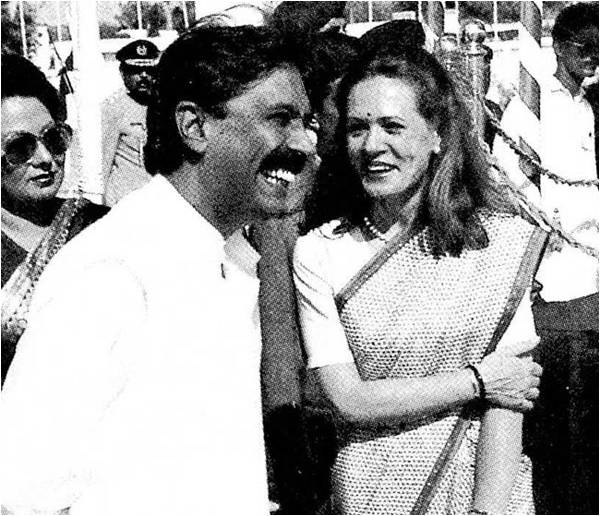
This is a photograph of Pakistan People’s Party leader Asif Ali Zardari and Indian National Congress leader Sonia Gandhi sharing a laugh at Islamabad’s international airport on July 17, 1989. At the time this photograph was taken, both Zardari and Sonia were spouses of prime ministers of Pakistan and India, respectively, and could not have predicted the tragic events that led to the deaths of their partners, and the responsibilities that would eventually be thrust in their hands.
Sonia Gandhi was accompanying her husband prime minister Rajiv Gandhi, foreign minister P.V. Narasimha Rao and other senior officials who had joined him for a trip to Paris for celebration of the bicentennial of the French Revolution, and then to Moscow for talks with Soviet leader Mikhail Gorbachev.
The Indian delegation flew into a high-security area of Islamabad’s international airport at about 3:50 pm on a flight from Moscow. The Gandhis were greeted by Pakistani premier Benazir Bhutto, her husband Asif Zardari and senior members of Bhutto’s government.
Rajiv Gandhi was greeted by a 19-gun salute and a military honour guard, including a band that played the Indian national anthem. It is the first official visit by an Indian prime minister to Pakistan since Gandhi’s grandfather, Jawaharlal Nehru, went in 1960 to sign an agreement on sharing river waters.
He made no statement and was whisked from the airport to a meeting with then president Ghulam Ishaq Khan in a bullet-proof Mercedes-Benz specially flown in from New Delhi, India.
Following the meeting with Ishaq Khan, Ghandi said India “respected the sovereignty and independence of Pakistan.”
“We do not have any intention of establishing our hegemony on Pakistan,” he said. “Now the time has come for the two of us to restructure our relations on correct foundations.”
Later, Bhutto and Gandhi sat in for a meeting that lasted nearly three hours. An official announcement after the meeting said both sides were determined to improve relations and solve all standing disputes.
At a banquet following the talks, Gandhi and Bhutto called for an end to interference in each other’s internal matters and respect for their territorial integrity and independence.
Gandhi called for an “end to action aimed at infringing (on) our integrity,” an oft-repeated allegation that Pakistan was helping Sikh extremists in India’s northern state of Punjab.
Bhutto said she was committed to building “our relations on the principles of equality, and respect for each other’s internal matters.” She repeated her government’s willingness to work toward nuclear non-proliferation in South Asia and to enter into arms limitation talks.
Gandhi’s arrival was marked by two peaceful anti-Indian demonstrations by hundreds of protesters in Rawalpindi, including one by residents of Pakistan’s side of the disputed Kashmir region. The Kashmiris chanted “down with Rajiv” as they marched to a U.N. office to deliver a protest note.
A second procession was sponsored by Islamic Democratic Alliance, which scorned improved relations with India. Marchers walked several miles to the outskirts of Rawalpindi, where they dispersed after burning an effigy of Gandhi.
Sonia Gandhi was accompanying her husband prime minister Rajiv Gandhi, foreign minister P.V. Narasimha Rao and other senior officials who had joined him for a trip to Paris for celebration of the bicentennial of the French Revolution, and then to Moscow for talks with Soviet leader Mikhail Gorbachev.
The Indian delegation flew into a high-security area of Islamabad’s international airport at about 3:50 pm on a flight from Moscow. The Gandhis were greeted by Pakistani premier Benazir Bhutto, her husband Asif Zardari and senior members of Bhutto’s government.
Rajiv Gandhi was greeted by a 19-gun salute and a military honour guard, including a band that played the Indian national anthem. It is the first official visit by an Indian prime minister to Pakistan since Gandhi’s grandfather, Jawaharlal Nehru, went in 1960 to sign an agreement on sharing river waters.
He made no statement and was whisked from the airport to a meeting with then president Ghulam Ishaq Khan in a bullet-proof Mercedes-Benz specially flown in from New Delhi, India.
Following the meeting with Ishaq Khan, Ghandi said India “respected the sovereignty and independence of Pakistan.”
“We do not have any intention of establishing our hegemony on Pakistan,” he said. “Now the time has come for the two of us to restructure our relations on correct foundations.”
Later, Bhutto and Gandhi sat in for a meeting that lasted nearly three hours. An official announcement after the meeting said both sides were determined to improve relations and solve all standing disputes.
At a banquet following the talks, Gandhi and Bhutto called for an end to interference in each other’s internal matters and respect for their territorial integrity and independence.
Gandhi called for an “end to action aimed at infringing (on) our integrity,” an oft-repeated allegation that Pakistan was helping Sikh extremists in India’s northern state of Punjab.
Bhutto said she was committed to building “our relations on the principles of equality, and respect for each other’s internal matters.” She repeated her government’s willingness to work toward nuclear non-proliferation in South Asia and to enter into arms limitation talks.
Gandhi’s arrival was marked by two peaceful anti-Indian demonstrations by hundreds of protesters in Rawalpindi, including one by residents of Pakistan’s side of the disputed Kashmir region. The Kashmiris chanted “down with Rajiv” as they marched to a U.N. office to deliver a protest note.
A second procession was sponsored by Islamic Democratic Alliance, which scorned improved relations with India. Marchers walked several miles to the outskirts of Rawalpindi, where they dispersed after burning an effigy of Gandhi.

